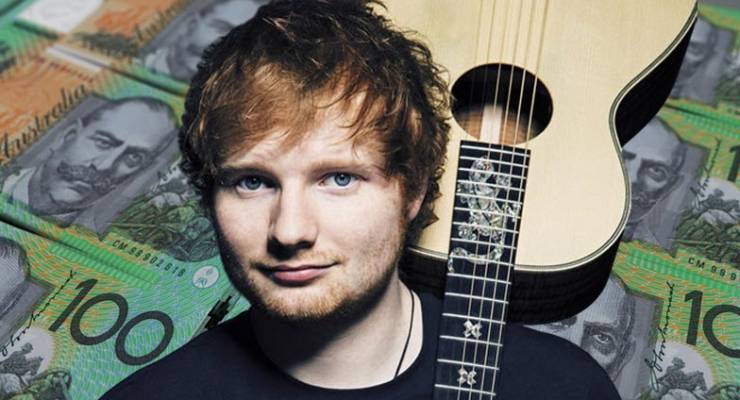
This March a new record will be set in Australia, with substantial economic and cultural implications. And I’m afraid you are not going to like it.
Australian rock legends AC/DC hold the record for the highest number of tickets sold for a run of gigs in Melbourne. They sold out Docklands arena for three nights in 2010, putting 180,000 deliriously happy fans through their run of smash hits. But on March 12 a graduate of the Academy of Contemporary Music in Surrey, UK will take to the stage at Docklands and blow AC/DC’s record out of the water.
Edward Christopher Sheeran — Ed to his fans — is about to set a new record by playing four stadium shows to 240,000 people (over 5% of the population of Melbourne). His 2018 tour is the biggest ever to come to Australasia, and will sell more tickets than the previously unassailable total of 900,000 achieved by Dire Straits in 1986.
There are two things to say about the Ed Sheeran phenomenon. The first is to marvel at the amounts of money involved. This is big enough to have an impact on the Australian economy.
If you want to buy one of the last available tickets to see Ed Sheeran play at Docklands in Melbourne, you’re up for $161.90. A handful of cheap seats were available for $70 before the show sold out, but most went for $100 or $160.
Multiply an estimated average price of $130 by 60,000 bums on seats and you start to get a sense of the economic scale of a show like this. I estimate total revenue of around $8 million a show.
That figure would put Ed Sheeran right near the list of top earning performers. Below is the list of tour earnings for 2017, which was topped by U2.

In 2018, it is quite likely Sheeran, who has 91 stops remaining on his enormous world tour, will jump up on this list.
Estimates vary, but a rough consensus suggests that big acts pocket about half the revenue from a sold-out show, after venue hire, logistics and paying local support acts. (You can see in the table above why the Rolling Stones keep touring. Pocketing $75 million for two weeks work would be hard to give up.) Of course bands like U2 and the Rolling Stones have to then split their takings between the members. Ed Sheeran presumably keeps all his, and takes it back to Britain.
Sheeran represents what is basically a very expensive import. We pay him $4 million for a gig that will be lucky to extend for two hours. To afford that, without upsetting the current account balance, the nation needs $4 million in exports, or roughly 80,000 tonnes of iron ore.
The good news for anyone worrying gnomish popstars might bankrupt the whole nation is that Ed Sheeran is a massive outlier. Apologies in advance to readers under the age of 24, but the popularity of Ed Sheeran continues to astound me and I suspect it will astound you too.
The music streaming service Spotify, which displays how many times each track has been played, often features popular songs listed at several hundred thousand streams each. But Ed Sheeran’s biggest song, “Shape of You“, has been played an astonishing 1.6 billion times in just over a year.
It is the most popular song on Spotify, by some distance, overtaking songs that have been around long enough to collect a lot more attention. The top Beatles song on Spotify has been played 145 million times, meaning that Ed Sheeran song gets 11 listens for every spin of “Here Comes the Sun”.
Sheeran’s dominance extends to YouTube where that same track has been played 3.2 billion times, besting massive recent pop hits adored by the internet generation: Beyonce’s top song has 600 million views, Adele’s has 2.2 billion, Taylor Swift’s 2.4 billion, “Gangnam Style” by Psy (the song that broke the internet) has 3 billion.
Notably, Taylor Swift and Beyonce have both just been involved in song collaborations with Ed Sheeran. Record companies recognise commercial dynamite when they see it and they try to make that explosive effect go as far as it can.
Australia, it seems, is especially rich territory for Ed Sheeran. Expect him to come back regularly.








Well, some of his revenues have to go to the people whose songs he, ah, homages.
… sincerest form of flattery. But I’ve got some of Eds music on my Spotify playlist
The author’s byline, its seems, needs to be revised to ‘Journalist, economist and nationalist’. I expect that would make clearer the assumptions underlying the article.
A bit of musical trivia for you. The Rolling Stones only have to split their earnings three ways instead of four. Why? Because back in the mid 1970s when Ronnie Wood joined the band he was offered either a cash advance of a few million dollars together with basic wages, or no advance and an equal share of future earnings. Not having a huge amount of faith in their longevity at that time, he took the cash advance, and has been on basic wages ever since. Keith Richards and Charlie Watts have wanted to bring him back in on equal shares for many years now, but the notoriously tight-fisted Mick Jagger refuses to allow it.
You call 100,000 pounds pa (that’s the figure I heard when he started … I wonder what it is now?) a basic salary? Also, the Stones are kind of a sideline for Ronnie. He has other talents.
I’m thinking (entirely without evidence, I admit) that 50% to the artist is a substantial exaggeration.
Never heard of him!
He’s probably like the rest of these ‘pop-stars’…can’t actually sing!!!!
People who pay these amazing amounts of money to attend such concerts, remind me of a mob of sheep…wool for brains!